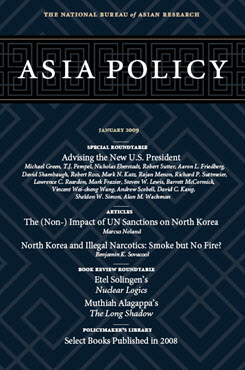The (Non-) Impact of UN Sanctions on North Korea
This article examines the extent to which UN Security Council sanctions imposed on North Korea following Pyongyang’s nuclear test have impacted North Korea’s foreign trade.
EXECUTIVE SUMMARY
MAIN ARGUMENT
Before North Korea conducted an underground nuclear test on October 9, 2006, it was widely believed that such an event would have cataclysmic diplomatic ramifications in Asia. Based on a visual inspection of the data and statistical models, this study finds that, although the UN Security Council imposed economic sanctions against the export of heavy arms and luxury goods to North Korea within one week of Pyongyang’s nuclear test, the imposition of these sanctions has had no perceptible effect on North Korea’s trade with the country’s two largest partners, China and South Korea.
POLICY IMPLICATIONS
- North Korea appears to have calculated correctly that the direct penalties to its foreign trade for establishing itself as a nuclear power would be modest (or, alternatively, Pyongyang put such a high value on demonstrating the country’s nuclear capability that it outweighed the downside risks, however large). Presumably this experience will condition the reactions of North Korean policymakers in the future—making deterrence with respect to this issue and other sources of conflict more difficult.
- Despite pre-test diplomatic warnings not to test, the post-test behavior of public and private sector actors in China and South Korea has been accepting of North Korea’s nuclear status. Thus if such warnings are to be heeded in the future, they must embody credible threats of penalty, be much more enthusiastically implemented, and be more broadly targeted.
About Asia Policy
Asia Policy is a peer-reviewed scholarly journal presenting policy-relevant academic research on the Asia-Pacific that draws clear and concise conclusions useful to today’s policymakers. Asia Policy is published quarterly in January, April, July, and October and accepts submissions on a rolling basis. Learn more


